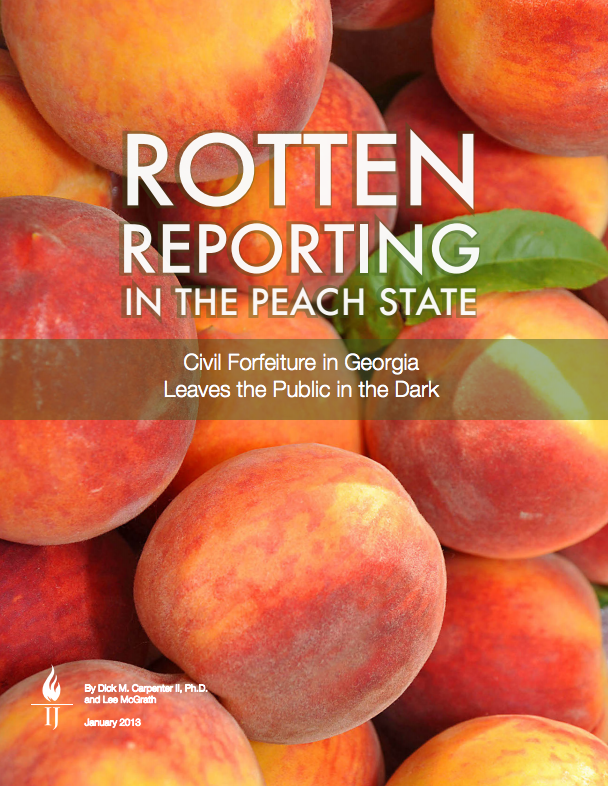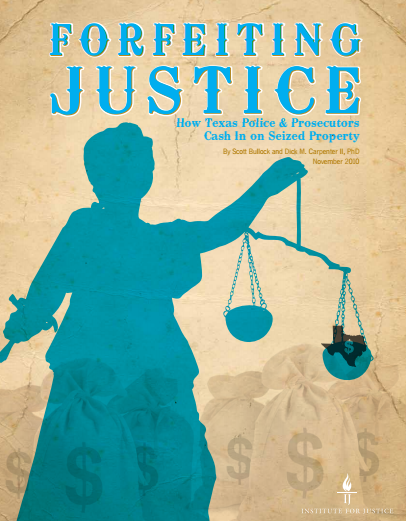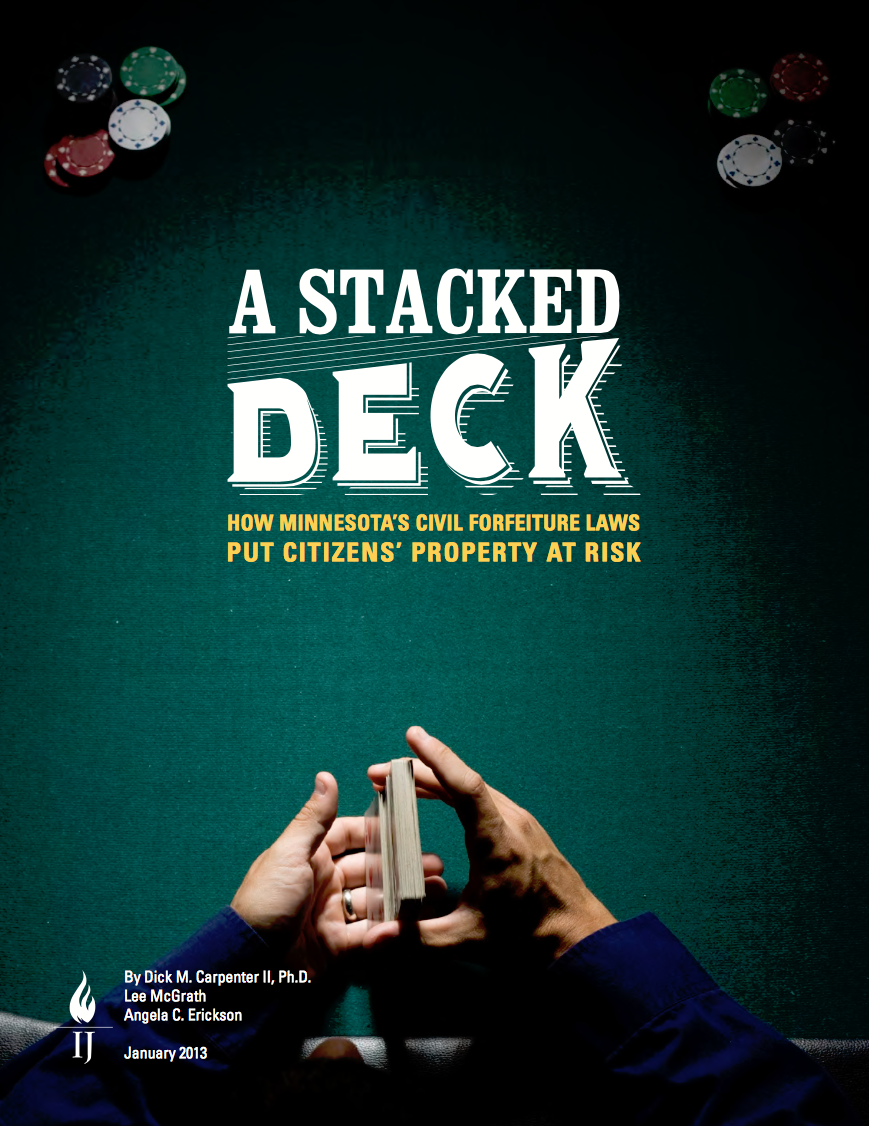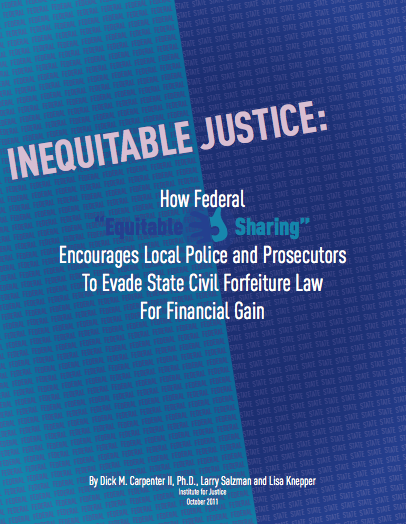The Institute for Justice’s flagship forfeiture report, Policing for Profit, grades the civil forfeiture laws of each state and the federal government and demonstrates how financial incentives to seize property, in combination with weak protections for property owners, put people’s property at risk. IJ has also published reports exposing the injustices with federal civil forfeiture programs, including “equitable sharing” and IRS “structuring” seizures.
Policing for Profit
The Abuse of Civil Asset Forfeiture
december 2020 (3rd edition)
By Lisa Knepper, Jennifer McDonald, Kathy Sanchez, and Elyse Smith Pohl
This third edition of “Policing for Profit” presents the largest ever collection of state and federal forfeiture data—17 million data points covering 45 states, the District of Columbia and the federal government. These data show forfeiture is a massive nationwide problem. Since 2000, states and the federal government have forfeited at least $68.8 billion—that we know of. Not all states provided full data, so this figure drastically undercounts property taken from people through forfeiture.
Do Americans support Forfeiture?
Do you support or oppose civil forfeiture?
As you may or may not know, “civil forfeiture” allows law enforcement officials to seize cash, cars, or other property if they suspect it is involved in a crime, even if the property owner has not been convicted or charged with a crime. Given this, to what extent do you support or oppose “civil forfeiture?”
- 8% – Strongly support
- 17% – Somewhat support
- 23% – Somewhat oppose
- 36% – Strongly oppose
- 15% – No opinion
Do you support or oppose allowing law enforcement agencies to use forfeited property or its proceeds?
Federal law allows law enforcement agencies to keep 100 percent of proceeds from property that has been forfeited. To what extent do you support or oppose allowing law enforcement agencies to use forfeited property or its proceeds for their own use?
- 7% – Strongly support
- 16% – Somewhat support
- 19% – Somewhat oppose
- 44% – Strongly oppose
- 15% – Don’t Know/No opinion
Do you support or oppose allowing law enforcement agencies to use forfeited property or its proceeds?
States like Minnesota and others have recently passed laws limiting the use of civil forfeiture, but legislators left in place a provision allowing local law enforcement to work with federal officials to bypass the tougher state law. Once federal prosecutors forfeit the property, they give 80 percent back to the local officials. Do you agree that state law enforcement officials should be allowed to participate in and benefit from forfeitures that are not permitted under state law?
- 7% – Strongly agree
- 23% – Somewhat agree
- 28% – Somewhat disagree
- 41% – Strongly disagree
IJ’s Civil Forfeiture Research
-
Rotten Reporting in the Peach State: Civil Forfeiture in Georgia Leaves the Public in the Dark
Georgia law enforcement agencies routinely fail to publicly report their forfeiture activities, despite a state law and a successful lawsuit requiring disclosure.
-
Forfeiting Justice: How Texas Police and Prosecutors Cash In On Seized Property
From 2001 to 2007, Texas law enforcement’s take from forfeited property tripled—and nearly a quarter was spent on salaries and overtime.
-
A Stacked Deck: How Minnesota’s Civil Forfeiture Laws Put Citizens’ Property at Risk
From 2003 to 2010, forfeiture revenue in Minnesota jumped 75 percent, even as crime rates declined, and the average value of forfeited property was only $1,000.
-
Inequitable Justice: How Federal “Equitable Sharing” Encourages Local Police and Prosecutors to Evade State Civil Forfeiture Law for Financial Gain
Federal laws encourage local law enforcement to skirt state property rights protections to cash in on seized property.
Our Goal:
End Civil Forfeiture
We are the Institute for Justice, a non-profit civil liberties law firm that defends private property rights across the country.
The Institute for Justice aims to curtail, and ultimately, abolish civil forfeiture, one of the gravest abuses of power in the country today. IJ has filed more than two dozen cases challenging civil forfeiture nationwide. In 2019, IJ secured a landmark victory at the U.S. Supreme Court when it ruled unanimously in Timbs v. Indiana that the Eight Amendment’s Excessive Fines Clause protects Americans against state and local forfeitures.





